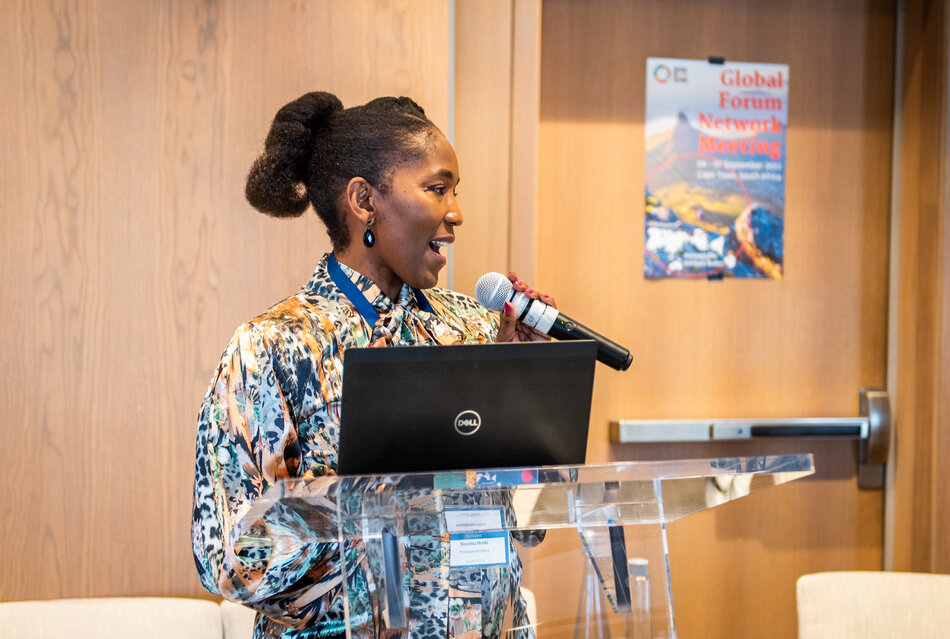Media

Further information
How multi-stakeholder SDG advisory bodies achieve impact: the complexity, consensus and co-creation framework
I have now been part of the secretariat of the Global Forum for nearly six months. I also continue to spend a lot of my time thinking about multi-stakeholder partnerships and advising the organisations that are part of them. These two parts of my working life come together because so many Global Forum members are also multi-stakeholder partnerships.
This blog is a reflection on how these partnerships add so much value to both national and international sustainable development. In particular, they are vital if we are to achieve the SDGs.
My reflections build heavily on an inspirational speech that I heard at the Global Forum’s network meeting in September by Namhla Mniki, Senior Executive at South African Presidency. Her powerful and insightful words have really stuck with me.
What still resonates the most is what Namhla said about the way that multi-stakeholder partnerships are vital to South Africa as it addresses the devastating consequences of COVID-19, of destructive riots and of floods.
Namhla framed this in terms of three C's: complexity, consensus and co-creation.
The first of these is complexity.
I would frame this as the highly connected nature of the challenges the world faces, which require system-level change in order to be addressed. This complexity has only deepened since the SDGs were developed. We therefore need to develop multi-faceted and highly coordinated actions that trigger system-level shifts if we are to achieve the SDGs. Multi-stakeholder partnerships can achieve this level of co-ordination, which no one sector of society – not even government – can achieve on its own.
Namhla pointed out that this requires us all to move away from a position of simple accountability that assumes we can be outsiders looking in, calling someone else to deliver on what needs to be done. Instead, implementing the SDGs in a complex environment is about everybody being accountable, and everyone having a role in actioning the things that need to happen.
SDG advisory bodies which are also multi-stakeholder partnerships can have a key role in contributing to this because they bring together interests from all parts of society to work closely with their government as a critical friend. They can also be a strong partner in implementation, as well as in tracking our progress and where we are falling behind.
The second C is consensus building.
This is needed because many sectors of society appear to have opposing interests, which means that the positions they adopt are adversarial. In this environment, how can solutions be found that balance these interests without causing winners and losers?
Namhla expressed this in terms of South Africa’s recent experience, saying that South Africans don't have the luxury to leave the SDGs to the government because the issues affecting everyone in terms of social and economic justice are life and death matters for many. She made the powerful point that the riots in South Africa in July last year were a reality for all.
Multi-stakeholder advisory bodies) strive to bring all sectors of society to join an SDG ‘conversation’. This can enable a society to grapple with the really difficult choices they need to make in implementing the SDGs. They have a key role to play in ensuring that there is a national level strategy to address complex channels and that all sectors of society are involved in finding solutions. Government must create an enabling environment for this but doesn't have the capacity to address these challenges alone.
Consensus building then ensures that the decisions made have broad-based support, have benefits for all in society, and also that they prioritise the right things in the right sequence. Building consensus across different stakeholders will also ensure that the SDGs are integrated front and centre in how policies are developed.
The third C is co-creation.
Different sectors of society, and also different political forces and economic interests within them, not only appear to have opposing interests but also different ideas about what the solutions may be to the complex challenges facing their society.
Multi-stakeholder partnerships are a powerful way of combing these different ideas in a creative process that generates entirely new solutions. SDG advisory bodies are often thus a key mechanism for society to co-create innovations as they bring a wealth of wisdom to help generate the answers needed.
Multi-stakeholder SDG advisory bodies also help to develop the institutional frameworks to make sure that trust is established so that these innovations can be co-created.
So what do I conclude from this?
I have rarely heard the argument for the role of partnerships that draw in all sectors of society – with SDG advisory bodies as a great example of these – put so clearly and cogently. The 3Cs of complexity, consensus and co-creation work so well for me as a framework, for the following reasons:
- My understanding of society is that it is a highly evolved system, and I am equally persuaded that multi-stakeholder partnerships have a rare ability to help address complexity.
- I believe that consensus is a strong concept which means finding solutions that work for all, not in making all sectors of society equally unhappy. Again, the best partnerships enable this process to happen.
- Finally, when I first encountered multi-stakeholder partnerships, I was excited about the opportunity they present for co-creation, and I still am nearly 20 years later.
As a member of the secretariat for the Global Forum, I hope to play a role in supporting our members – and new members that may yet join us – to support their governments and all other actors in their countries to achieve the SDGs. As they do this, I am sure they will be having impact in the ways described in the 3C’s framework.

